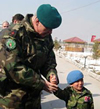Number 47 | June 30, 2008
The following is an excerpted version of a speech by Matthew Bryza, Deputy Assistant secretary of State for European and Eurasian Affairs, delivered at the Washington Institute for Near East Policy’s ninth Turgut Ozal Memorial lecture on June 24, 2008. The full version of the speech and online audio is available at www.washingtoninstitute.org.
Three Clusters of Interests
Energy and Central Asia. Today, we are focusing on the next phase of Caspian development, looking to the Caspian Basin and Iraq to help reduce Europe's dependence on Russia's energy company Gazprom, which provides 25 percent of all gas consumed in Europe.
Our goal is to develop a "southern corridor" energy infrastructure to transport Caspian and Iraqi resources to Turkey and Europe. The Turkey-Greece-Italy (TGI) and Nabucco natural gas pipelines are key elements of this corridor. The two pipeline projects could provide Europe up to 44 billion cubic meters (BCM) of new gas supplies over the next seven to twelve years, of which 20 BCM (a significant amount) will hopefully come from Azerbaijan, while the rest from Iraq and the Caspian Basin.
In Afghanistan, Turkey has made important contributions to reconstruction and the International Security Assistance Force (ISAF). During the Paris Conference earlier this month, Turkey increased its original $100 million humanitarian assistance pledge for Afghanistan to $200 million. Since 2002, Turkish firms have invested $1.5 billion in Afghan projects that have included schools, mosques, hospitals, health clinics, bridges, and water wells.
Shared vision and security. Since 2006, we have made important progress in undercutting the Kurdistan Workers Party's (PKK) financial, operational, and political support mechanisms in Europe through a robust combination of political pressure and information sharing. But the continued presence of PKK terrorist bases in northern Iraq led many Turkish citizens to resent -- what they perceived as -- a U.S. bias toward its own main national security threat (al-Qaeda) while treating Turkey's security interests differently. But the November 2007 Oval Office meeting between President Bush and Erdogan marked a decisive turning point. Bush's designation of the PKK as "an enemy of Turkey, an enemy of Iraq, and therefore an enemy of the United States," signaled Washington's new approach.
The public sentiment surrounding our bilateral ties is different from that at the government level. Although we have renewed governmental cooperation with Turkey, this has not translated to Turkish society. It will take a while for the Turkish people to get over the "hood incident" -- a reference to the events of July 4, 2003, when U.S. troops arrested, hooded, and detained eleven Turkish soldiers in northern Iraq. The Valley of the Wolves and Metal Storm -- a Turkish film and book respectively that inflamed Turkish attitudes toward the United States -- also did serious damage. I think it would help tremendously if the Turkish government told its people the extent of our cooperation and what we are doing to improve relations.
Regarding Iran, while we recognize Turkey's longstanding economic and political relationship with its neighbor, we look to Ankara to be a regional leader and reinforce the international community's demands that Iran cease its uranium enrichment program. Moving forward, we need a strong commitment from Turkey and the international community to send the message to Tehran that we are united.
We anticipate that Turkey will maintain its deep ties with Israel, something that developed into a strategic partnership in the 1990s based on shared democratic values. Turkey is making important contributions to maintaining peace and restoring stability in Israel's northern neighbor, Lebanon. Turkey can also play an important role in supporting economic growth in the Palestinian territories.
We are also upbeat about the Cyprus process. We support a bi-zonal, bi-communal federation in the island.
Democratic and market reform. The United States remains convinced that Turkey's eventual membership in the European Union would benefit Europe and Turkey alike. Turkey's blend of democracy, secularism, and rule of law can help deepen our understanding of how to integrate Muslim populations into society while countering extremism. Meanwhile, Europe's criteria for accession to the EU provide a set of incentives for sustained reforms that, while in Turkey's national interests, are difficult to make politically.
The current Constitutional Court case against the ruling Justice and Development Party (AKP) is a good example of this conundrum. Turkey's vibrant political system is the product of its historical experience, and as in the past, Turkish democracy will work through this difficult challenge. In the end, a democracy requires its voters to determine the country's political future, and Turkey's voters made clear decisions during the 2007 elections. Prime Minister Erdogan, President Abdullah Gul, and other Turkish leaders have underscored the crucial importance of maintaining the separation of mosque and state through the central constitutional principle of secularism. Ultimately, we are confident our Turkish allies will rely on their Anatolian traditions of pragmatism and tolerant faith, combined with a modern embrace of scientific learning, to resolve the current controversy in a way that strengthens Turkish democracy.

























